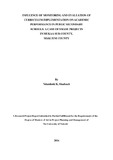Influence of Monitoring and Evaluation of Curriculum Implementation on Academic Performance in Public Secondary Schools: a Case of Smase Projects Inmukaa Sub-county, Makueni County

View/
Date
2016Author
Ndambuki, Shadrack K
Type
ThesisLanguage
enMetadata
Show full item recordAbstract
The purpose of this study was to investigate the influence of monitoring and evaluation of
curriculum implementation on academic performance in public secondary schools in Mukaa
Sub County, Makueni County. The study focused on the SMASE projects in Mukaa Sub
county and was guided by the following objectives: to assess the influence of monitoring and
evaluation of classroom activities on academic p e r f o r ma n c e in Physics in public secondary
schools in Mukaa Sub County , to establish the influence of monitoring and evaluation of school
management on academic performance in Physics in public secondary schools in Mukaa Sub
County , to determine the influence of monitoring and evaluation of teachers’ professional
development on academic performance in Physics in public secondary schools in Mukaa Sub
County and to establish the influence of monitoring and evaluation of instructional policy and
planning on academic performance in Physics in public secondary schools in Mukaa Sub
County. The study adopted a Descriptive Survey Research design. The target population was 65
comprising of 30 principals, 30 s c i e n c e department heads, 2(two) County Staffing Officers,
(CSO), 2 (two) Strengthening Mathematics and Science (SMASE) Coordinators and
1(one) Quality Assurance Officer, (QASO). The researcher used census sampling to identify the
respondents. A total sample size of 65 respondents was used in the study. Validity of the research
instruments was ensured by undertaking a pilot test in 4 schools. Reliability of the instruments was
then computed by correlating the results of the 4 schools to determine the reliability coefficient. The
questionnaires were used as the main research instruments. The questionnaires were administered
to principals and head of science department while the interviews were conducted for the SMASE
coordinators, CSO and the QASO. The researcher used Statistical Package for Social Sciences
version 21.0 to analyze the data. Descriptive statistics such as frequencies and percentages was used
to summarize the data. Fur ther analys i s was done us ing cor r elat ion and r egr es s ion
model s . The key findings for this study were; firstly, physics classroom activities greatly
influence academic performance in secondary schools and that the SMAS E p r o j e c t s
imp l eme n t a t i o n p r o c e s s needs to be closely monitored and evaluated to enhance more
efficiency. Secondly, the school management significantly influenced the performance of physics
and that the management needs to be audited to suit the needs of SMASE projects. Thirdly, the
study concluded that the teachers’ pro fes s io nal deve lopment determines academic
performance in physics since this is one of requirements of the implementation of SMASE projects
in schools. This is because there is a positive correlation between teacher’s professional
development and academic performance of students in physics. Finally, the study concluded that
there is a strong relationship between instructional policy and planning and academic
performance of students in physics. The researcher recommended that monitoring and
evaluation of physics classroom activities should involve SMASE projects coordinators at the sub
county levels; school management audits should be raised a notch higher as part of monitoring and
evaluation of school management; teachers’ professional development programs to be monitored
and evaluated to ensure that they benefit the learners and not only the teacher; the ministry of
education to hire and train more quality assurance and standards officers to conduct monitoring and
evaluation of curriculum implementation in schools to ensure educational projects and programs such as
SMASE are implemented to promote good academic performance of the learners. The study hopes to
increase the available knowledge in the field of monitoring and evaluation of educational projects
and programs to complement other quality assurance initiatives within the education system, which
include program and service reviews and monitoring of learning achievements. The knowledge
from this study is hoped to assist the school inspectors and administrators in designing
effective practices for monitoring and evaluating curriculum implementation at classroom. The
findings from this study may create awareness to the Ministry of Education to review its
policies on school inspection, management and recruitment of quality assurance and standards
officers.
Publisher
University of Nairobi
